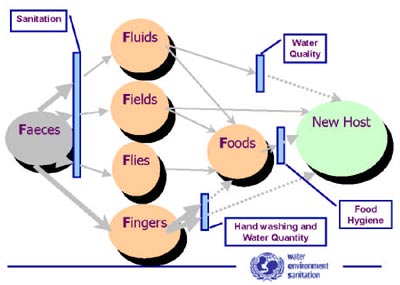This is an archived version of our water page and is not actively maintained. For up-to-date content, see our current water page.
- Water-related illnesses, mostly diarrhea, cause the deaths of more than 1 million children each year in the developing world.1 Charities aim to provide health and other benefits via improved water sources.
- Benefits depend on many factors, such as the extent of water quality improvement, the convenience of a new water source compared to pre-existing water sources, and whether a water source is maintained appropriately.
- We have not yet found an organization we can confidently recommend focused on improving water sources. (More)
Table of Contents
How do charities help?
There are a wide variety of approaches to improving water sources. Some charities focus on creating or improving public water points, while others aim to bring water into the home via tap connections. In addition to reducing the effort necessary to collect water, these programs aim to improve health, particularly by reducing diarrhea incidence.2
What are the challenges of finding a great charity?
We feel that the success of a water project depends heavily on the following:
- How significant is the improvement in (a) water quality, and (b) convenience? The Disease Control Priorities report argues that water programs are unlikely to have significant health benefits unless they also have significant convenience benefits, leading to behavior change.3
- Are improvements to water infrastructure maintained over time? Evidence suggests that a significant number of water improvement projects are abandoned and fall into disrepair.4
Note that water is not the only, or necessarily the main, way that relevant diseases are transmitted.5

Where should you give?
We have not yet found a charity in this area that we can confidently recommend. For donors interested in improving lives in the developing world broadly, we recommend our top international charities. For donors committed to supporting water-related programs specifically, we recommend starting with Water.org, the only charity we've seen in this area that publishes reports assessing the condition of its wells over time.6 We also recommend asking water charities the following questions:
- Can you share pre-project reports on the conditions of, and distances to, communities' pre-existing water sources?
- How do you assess the improvement in water quality brought about by your projects? Can you share evidence along these lines?
- How do you ensure that your water infrastructure improvements remain operational over the long term? Can you share the reports that come from your process for this?
- Do you address other sources of relevant diseases, such as hygiene practices?
- Do you track the impact of your programs on disease incidence and prevalence over time and can you share technical reports on this?
Full list of water charities we considered
This is an archived version of our water page and is not actively maintained. For up-to-date content, see our current water page.
The table below shows the 13 water-related charities whose websites we have reviewed. Most of them focus on providing infrastructure improvements, such as wells.
For each, we checked whether they published, on their website, monitoring reports of the long term condition and utilization of wells they had built.7
| Organization | Long term monitoring of wells? | Type of information available |
|---|---|---|
| Water.org (website) | Yes | Two reports available.8 |
| Water For People (website) | No | - |
| Living Water International (website) | No | - |
| Water Missions International (website) | No | - |
| WaterCan/EauVive (website) | No | - |
| Blood:Water Mission (website) | No | - |
| PlayPumps International (PlayPumps is no longer active) | No | - |
| Lifewater International (website) | No | - |
| WaterAid (website) | No | - |
| Ryan’s Well Foundation (website) | No | - |
| Malawi Freshwater Project (website) | No | - |
Sources
- Water.org. Impact evaluation of urban and rural water and sanitation projects, Bangladesh (PDF).
- Water.org. Water Partners International community water systems sustainability evaluation, Lempira, Honduras (PDF).
- UNICEF. Keep it clean. http://www.unicef.org/voy/explore/wes/explore_1929.html (accessed October 26, 2010). Archived at http://www.givewell.net/files/ExternalWebsites/Unicef/diarrheadiagram.p….
- 1
See our diseases page for background information on diarrhea.
- 2
- 3
- 4
- 5
Image from UNICEF, "Keep It Clean."
- 6
Note that Water.org was formerly known as Water Partners International.
- Water.org, "Impact Evaluation of Urban and Rural Water and Sanitation Projects, Bangladesh."
- Water.org, "Water Partners International Community Water Systems Sustainability Evaluation, Lempira, Honduras."
- 7
Note that we checked these websites during the spring of 2009 and this table is up-to-date as of that time.
- 8
- Water.org, "Impact Evaluation of Urban and Rural Water and Sanitation Projects, Bangladesh."
- Water.org, "Water Partners International Community Water Systems Sustainability Evaluation, Lempira, Honduras."
